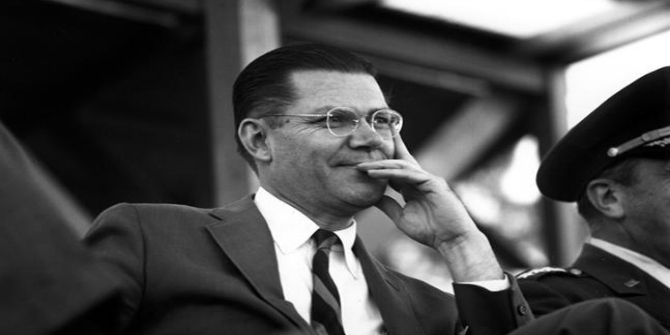In Robert McNamara’s Other War: The World Bank and International Development, Patrick Allan Scharma attends to the lesser-studied final act of McNamara’s political career – his role as leader of the World Bank. This thoroughly researched book offers a detailed and memorable account of both McNamara and this vital moment in the history of global economic development, yet occasionally pulls its punches when it comes to fully grappling with this controversial figure’s political morality, writes John Picton.
Robert McNamara’s Other War: The World Bank and International Development. Patrick Allan Scharma. University of Pennsylvania Press. 2017.
Robert Strange McNamara is now condemned in history. Secretary of Defense under Presidents John F Kennedy and Lyndon Johnson, he escalated the Vietnam War, a remorseless conflict that killed countless numbers without a clear justification. A cerebral man, he was in the end tormented by an introspective nature. His New York Times obituary records his later years: ‘in the streets of Washington — stooped, his shirttail flapping in the wind — walking to and from his office a few blocks from the White House, wearing frayed running shoes and a thousand-yard stare.’ He seems to have accepted a weight of guilt, confessing: ‘we were wrong, terribly wrong.’
Before his death, McNamara had attempted a type of redemption. Perhaps having had enough of destruction, in 1968 he took the helm of a global development organisation – the World Bank. In Robert McNamara’s Other War: The World Bank and International Development, Patrick Allan Sharma recounts this last act of McNamara’s career. Based on fresh source material, the author draws a memorable picture of the Bank President’s personality and his management style. The book is thoroughly researched and provides a detailed account of an important era in the history of global economic development.
The work is at its most illuminating where it focuses upon the character and background of McNamara. Educated at Harvard Business School, McNamara was part of an ascendant post-war US elite, an emergent bureaucratic class with a new global power. He had risen up the ranks to become President of the Ford Motor Company, and brought spectacular profits back to the ailing Detroit giant. Trained in a new style of statistics-based management, he took an audit-led approach to goal-driven organisational change 67). He was an almost stereotypical technocrat, described as having ‘hair slicked back and eyes poring over numbers from behind wire-rimmed glasses’ (19). Intriguingly, in the light of the high death toll in Vietnam, he introduced safety features to motor vehicles at Ford, such as padded panels and seatbelts.
McNamara’s background is shown to have influenced his management style at the Bank. The job matched his skillset. McNamara was an extraordinarily deft and supremely well-connected bureaucrat. He was also a transformative manager. Under McNamara’s leadership, the number of Bank staff more than doubled (42). He changed its global function, shifting the Bank’s core focus away from tangible and targeted development projects — such as dams and roads — to political economy and the privatisation and trade liberalisation of poor countries (138).
 Image Credit: Robert McNamara, US Secretary of Defense, Fort Bragg, 12 October 1961 (Cecil Stoughton, White House photographer, Wikipedia Public Domain)
Image Credit: Robert McNamara, US Secretary of Defense, Fort Bragg, 12 October 1961 (Cecil Stoughton, White House photographer, Wikipedia Public Domain)
Within the book are intriguing hints that McNamara was not well-liked by staff. It seems he worked them very hard. Upon retirement, he was gifted the traditional clock, but subject to an ironic twist – the clock was said to represent the precision with which he ran boardroom meetings (160). That was the level at which he was most comfortable. In fact, he had rarely met mid-level employees, and at times morale in the organisation was very low. His highly proficient Bank staff complained that they felt as workers might on an assembly line (142). One official declared that the object of the organisation was just to go out and make loans, and that many of the projects of the bank folded (128). What mattered were the balance sheets. In other words, in the spirit of Henry Ford, he had made the Bank into a credit factory.
Robert McNamara’s Other War is a valuable resource to anyone interested in this area of history. However, it does perhaps pull its punches in relation to policy critique. It details a series of loans and projects which were prone to corruption or unacceptable social costs, but never quite explains how such decisions might have come about in the first place. For example, in one Bank-funded project, money was provided to settle half a million Javan families — an enormous movement of people — on less populated Indonesian islands. As part of that transplantation process, General Suharto’s government forcibly removed native populations, deforesting land to accommodate the newcomers (120). That the World Bank should have been involved in such a project is shocking.
Yet, despite detailing bad policy decisions and the book’s explicit focus on McNamara’s personality, it does not connect the two. This is a shame, because the book hints at, but never quite mounts, an interesting substantive critique. It is possible to draw, for example, an ideological link between McNamara’s willingness to tolerate the forcible removal of native populations in Indonesia, his introduction of seatbelts at Ford and his endorsement of large-scale killing in Vietnam. This can be done if he is understood as a company man, an intellectual bureaucrat focused on cost-benefit analysis.
The author writes that McNamara fell ‘to personal and professional lows as the architect of the Vietnam War’ before coming ‘to resurrect himself in unexpected ways as president of the World Bank’ (77). This raises the question of what type of resurrection he achieved. Perhaps he attempted to revive his reputation for the benefit of history, but it is not at all clear that he ever altered his political morality. For McNamara, it seems, the ends justified the means.
Robert McNamara’s Other War: The World Bank and International Development provides a comprehensive and well-researched account of a previously little-studied topic. It is at its most pertinent where it connects McNamara’s management style with his personality. Yet, in regard to a more direct critique, while it contains a rich seam of detail, the book never quite links McNamara’s personality with his political agency.
Please read our comments policy before commenting.
Note: This review is provided by our sister site, LSE Review of Books. It gives the views of the author, not the position of EUROPP – European Politics and Policy or the London School of Economics.
_________________________________
John Picton – University of Liverpool
John Pictorn is Lecturer in Law at the University of Liverpool, where he is a member of the Charity Law and Policy Unit. He tweets @JohnPicton5


 Find this book:
Find this book: 
